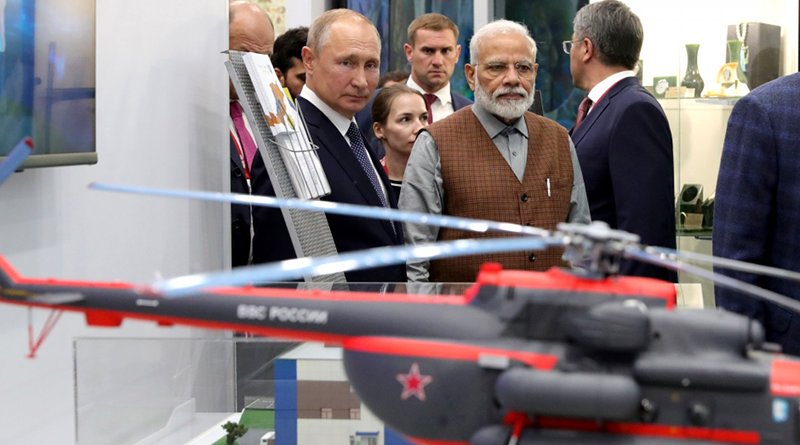Russia Isn’t Honest Broker In Intensifying China-India Military Confrontation – Analysis
By Dr. Subhash Kapila and SAAG
By Dr Subhash Kapila
The China-India Military Confrontation in mid-2020 displays all the portents of unfolding intensification and India’s foreign policy establishment should dispense Indian policy illusions that Russia immersed deep in China-Russia Strategic Nexus can broker sustainable peace with China.
Russia in 2020 has no geopolitical or economic leverages over China to restrain China from its Hitlerian impulses of Nazi Germany on eve of the Second World War of running on a wild rampage on all its peripheries over the vast Indo Pacific geopolitical expanse.
India’s foreign policy establishment needs to recognise that Russia long ago lost its value as a ‘Strategic Asset’ for Indian foreign policy objectives. Russia is heavily weighted down geopolitically in favour of China.
Russia’s demonstrated only ‘tokenism support’ in China-India War 1962 and Russia’s much much-vaunted support during India-Pakistan War 1971 was support limited only to liberation of East Pakistan by Indian Army and creation of Bangladesh.
When Indian Army planned moving of military formations to the West Pakistan Border which could have probably led to some dismemberment of West Pakistan, Russia reportedly demurred and sided with United States to pressurise India against sizeable offensive Indian Army mobilisation against West Pakistan, then lying strategically and politically prostate.
Russia in the run-up to India-Pakistan War 1965 had provided some armaments to Pakistan. Russia’s brokering of peace the 1965 War in the much-hailed Tashkent Peace Talks was not certainly India-friendly and Russian pressures at Tashkent on then PM Lal Bahadur Shastri to cede major concessions to Pakistan led to his untimely demise at Tashkent itself.
Even in the 21st Century, in the last decade, Russia peeved at India’s growing intensification of US-India Strategic Partnership, in a petulant respones collaborated with China to set up the Russia-China-Pakistan Trilateral to side-line India from any role in peace and reconciliation in Afghanistan. This petulant response arose because China and Pakistan wanted it so. Enough SAAG Papers authored by me have analysed this aspect in detail.
Nothing hit me hard on Russia’s pro-China stances than what I experienced at an officially sponsored International Seminar a couple of years back in Moscow on the South China Sea Dispute when I was virtually snubbed during my Paper presentation on my critical references to China’s aggressive bullying of Vietnam and other ASEAN small nations. Russian academicians who later presented Papers were noticeably strongly supportive of China’s stand on South China Sea disregarding that Russia-Vietnam ties earlier outweighed Russia’s ties with China.
The above contextual background would logically spawn glaring questions in mid-2020 against the backdrop of the Mud-May 2020 violent border clashes between Indian Army and Chinese Army aggressors attempting to intrude into Indian Territory.
The glaring questions that India’s foreign policy establishment must realistically face are (1) Is India justified in reposing trust in Russia to broker sustainable peace in ongoing China-India Military Confrontation? (2) Russia having itself been subjected to violent border clashes by Chinese Army in 1969 and thereafter, would be able to broker a sustainable India-China Border Dispute settlement (3) In event of an inevitable China-India Armed Conflict possible over Boundary Dispute, India’s military intervention against a Pakistan-provoked and China-supported military provocation against India, what would be Russia’s policy stance? (4) Does Russia unequivocally profess “Strategic Trust” in China’s intentions and aggressive actions all over the Indo Pacific?
In my considered assessment, the answers to the above questions are all negative and militate against India reposing strategic trust in Russia that it would assist India in any confrontation with China in the future. The tilt of Russia in that eventuality would be towards China.
Geopolitically, when viewed against current power-play against Major Powers, Russia has no choice or option but to side with China. Russia in deference to China has even retreated from its much publicised ‘Strategic Pivot to Asia Pacific’ and thereby foreclosed all meaningful options to be a responsible stakeholder in Indo Pacific Security, and that by extension includes India.
Then why India should be seen in mid-2020, when India has been able to carve a niche in global power calculus, as yielding to Russia in attempts to find options to neutralise China’s aggressive propensities which today do not stand confined to India only but encompasses the vast Indo Pacific strategic canvass.
Is Russia helping China in its current initiatives to prevail over India for RIC dialogues or helping China?. That is the crucial point that needs to be realistically appraised by India’s foreign policy establishment.
India consequently should be seen as the moving spirit to mobilise concerted global support to forge an international coalition for countering China’s aggressive propensities, notwithstanding its sentimental attachment to Russia. There is no place for sentimentalism in geopolitical power-play.
In the same vein, it was galling to see as a policy analyst that India’s Foreign Minister would be sitting down inadvisably today with the Chinese Foreign Minister in a virtual summit of the Russia-India-China Trilateral. Is it not strategically demeaning for India to do so just a week after Chinese aggression killed treacherously in Eastern Ladakkh 20 Indian Army personnel including a Colonel leading from the front?
Past SAAG Papers of mine have debunked the underlying premises of India’s continued attachment to Russia-India-China Trilateral and it stands more debunked by contemporary geopolitical developments in South Asia.
Concluding, it needs to be over-emphasised that Russia with its present geopolitical compulsions cannot be an ‘Honest Broker’ in the intensifying China-India Military Confrontation markedly visible in mid-2020. Russia has no geopolitical options but to continue, as I have written before to be the ‘Junior Partner’ in the Russia-China Strategic Nexus, with no strategic leverages to prevail over China to intercede in India’s favour.

